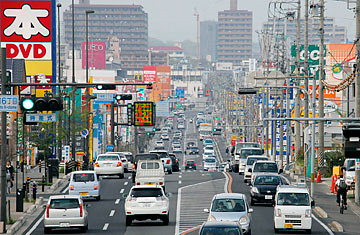
Toyota City, Japan
For bespectacled Sirou Hirayama, times have never been so bad. He and his wife Kiyomi, standing behind the counter at the Toyomi pharmacy in downtown Toyota City, home to Japanese car giant Toyota Motor, complain that the global recession has so punished the local economy that his sales are down 20% from 18 months ago. Now, with Toyota facing a crisis over the safety of its cars, Hirayama fears more hard times down the road. "Toyota was known for quality cars. Now that's changed 180 degrees," he says. "I'm fearful of the impact. The whole area is dependent on Toyota."
That gloom is enveloping Toyota City. The town of 420,000 in eastern Japan has been synonymous with Japanese manufacturing prowess for decades. The residents were so proud of Toyota that in 1959 they changed the city's then name, Koromo, to match its most important citizen. But the town's fortunes rise and fall with Toyota's. The firm's sprawling factory complexes lie only a short distance from the town center, and, as in any company town, the paychecks of Toyota employees are the main source of support for its restaurants and shops. According to city statistics, 77,000 people in the town work in auto-related industries. The entire region is connected to Toyota, with independent suppliers of parts spread through the surrounding countryside and nearby cities. "Toyota is the biggest company in this area," says Masahiko Hosokawa, a business professor at Chubu University in Nagoya, the closest major metropolis to Toyota City. If Toyota's crisis depresses its global sales, "it will have an impact here," he says.
The timing is terrible. In recent months, Toyota City — which boasts Detroit as a sister city — has shared some of the pain felt by its American counterpart. The region is still suffering from what locals call the Toyota shock. After the Lehman bankruptcy, when the worst of the financial crisis bit and the U.S. car market collapsed, Toyota reduced production and shed temporary workers, sending a damaging ripple through the region. The scars are clearly visible on the town's streets, riddled with closed shops and restaurants. Ryuichi Watanabe, an agent at the local branch of the Able property brokerage, says rents are down some 20% from two years ago, with many apartments lying empty. He worries the worst may be yet to come. "The myth of Japanese quality has crumbled," he says. "That means less markets and a negative impact on the entire economy."
Toyota City already gives an impression of a town under siege. Toyota's giant headquarters building is inaccessible — like a fortress at war. A spokesman for the city wouldn't grant TIME an interview with officials, saying the government won't comment on the issues of one company. Toyota employees are keeping their lips tightly sealed as well. Those approached on the streets, their Toyota company IDs clearly visible, politely bow their heads and say they are unable to comment. Only one young employee, who wouldn't give his name, mutters, "We're not sure what is going to happen."
Yasuteru Kamiya has no doubt though. The proprietor of the Happy End café in Toyota City's center sees Toyota's current crisis as yet another stop in the town's 30-year decline. Toyota City, he says, has never regained the bustle it enjoyed back in the 1980s, during the go-go years when Japan was the rising force of the global economy. Since the Toyota shock, Kamiya's sales are down 50%. "We're very worried that we can't continue," he says. And that all depends on Toyota.
— With reporting by Terrence Terashima / Toyota City
